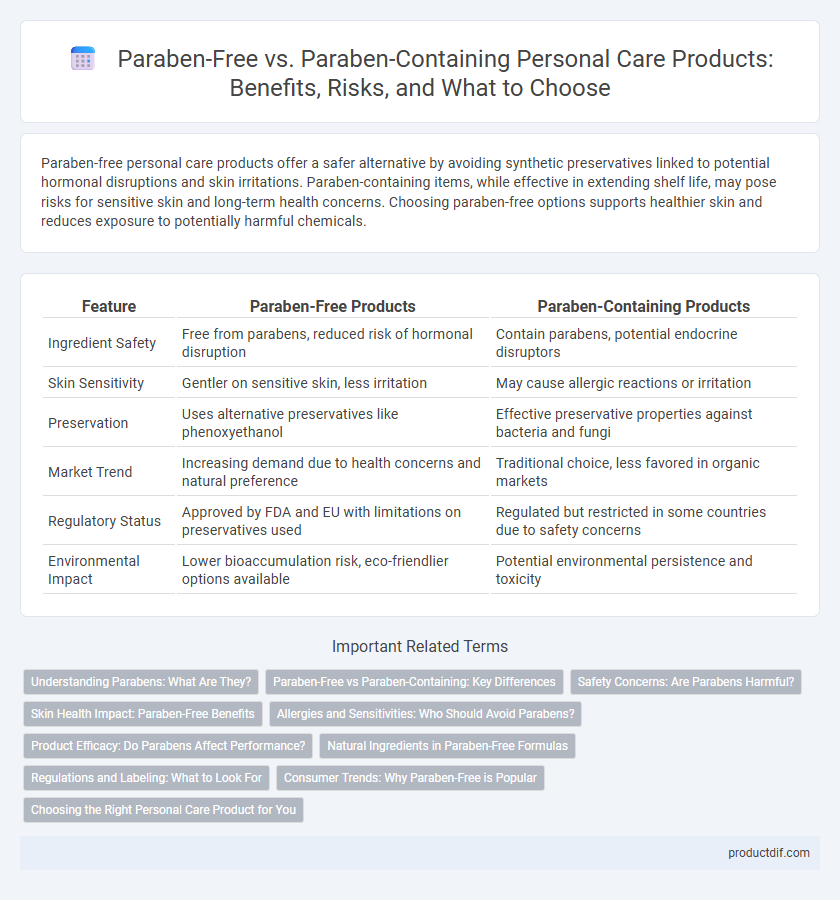Paraben-free personal care products offer a safer alternative by avoiding synthetic preservatives linked to potential hormonal disruptions and skin irritations. Paraben-containing items, while effective in extending shelf life, may pose risks for sensitive skin and long-term health concerns. Choosing paraben-free options supports healthier skin and reduces exposure to potentially harmful chemicals.
Table of Comparison
| Feature | Paraben-Free Products | Paraben-Containing Products |
|---|---|---|
| Ingredient Safety | Free from parabens, reduced risk of hormonal disruption | Contain parabens, potential endocrine disruptors |
| Skin Sensitivity | Gentler on sensitive skin, less irritation | May cause allergic reactions or irritation |
| Preservation | Uses alternative preservatives like phenoxyethanol | Effective preservative properties against bacteria and fungi |
| Market Trend | Increasing demand due to health concerns and natural preference | Traditional choice, less favored in organic markets |
| Regulatory Status | Approved by FDA and EU with limitations on preservatives used | Regulated but restricted in some countries due to safety concerns |
| Environmental Impact | Lower bioaccumulation risk, eco-friendlier options available | Potential environmental persistence and toxicity |
Understanding Parabens: What Are They?
Parabens are synthetic preservatives commonly used in personal care products to prevent microbial growth and extend shelf life. These chemical compounds, such as methylparaben and propylparaben, have raised concerns due to potential hormone-disrupting effects linked to health risks. Choosing paraben-free products helps reduce exposure to these preservatives while supporting a more natural approach to skincare and hygiene.
Paraben-Free vs Paraben-Containing: Key Differences
Paraben-free personal care products avoid synthetic preservatives linked to hormone disruption and allergic reactions, enhancing safety for sensitive skin. Paraben-containing products use parabens like methylparaben or propylparaben to prevent microbial growth, extending shelf life but raising health concerns. Consumers seeking natural, hypoallergenic options prefer paraben-free formulas due to growing evidence of parabens' potential endocrine effects.
Safety Concerns: Are Parabens Harmful?
Paraben-free personal care products avoid synthetic preservatives linked to potential hormonal disruptions, reducing risks of skin irritation and endocrine interference. Paraben-containing products, while effective in preventing microbial growth, have raised safety concerns due to alleged associations with breast cancer and reproductive toxicity. Choosing paraben-free formulations supports a safer skincare routine prioritizing long-term health and minimizing exposure to controversial chemicals.
Skin Health Impact: Paraben-Free Benefits
Paraben-free personal care products minimize exposure to potentially harmful preservatives linked to skin irritation and hormone disruption, promoting healthier skin. Studies show paraben-free formulations reduce allergic reactions and sensitivity, especially in individuals with eczema or sensitive skin. Choosing paraben-free options supports long-term skin health by preventing inflammation and maintaining the skin's natural barrier function.
Allergies and Sensitivities: Who Should Avoid Parabens?
Individuals with sensitive skin or a history of allergies should avoid paraben-containing personal care products due to the potential for skin irritation and allergic reactions. Parabens can disrupt the skin's natural barrier, leading to increased sensitivity and inflammation in susceptible users. Choosing paraben-free formulations reduces the risk of adverse effects for those prone to contact dermatitis or allergic responses.
Product Efficacy: Do Parabens Affect Performance?
Paraben-free personal care products maintain product efficacy by utilizing alternative preservatives that effectively inhibit microbial growth without compromising formulation stability. Studies indicate that parabens do not directly enhance product performance but serve solely as preservatives, meaning their absence does not reduce the cleansing, moisturizing, or protective functions of the product. Consumers choosing paraben-free options benefit from comparable efficacy alongside reduced exposure to potential endocrine-disrupting chemicals.
Natural Ingredients in Paraben-Free Formulas
Paraben-free personal care products prioritize natural ingredients such as plant extracts, essential oils, and vitamins, reducing exposure to synthetic preservatives linked to health concerns. These formulas often utilize alternatives like benzyl alcohol, phenoxyethanol, and organic acids to maintain product freshness while preserving skin health. Consumers increasingly choose paraben-free options to benefit from gentle, naturally-derived components that support sensitive skin without compromising efficacy.
Regulations and Labeling: What to Look For
Paraben-free personal care products often highlight their status on packaging due to increasing consumer demand driven by health concerns linked to parabens, which are regulated differently across regions. The U.S. FDA allows parabens in cosmetics but requires accurate labeling, while the EU strictly limits their concentrations under cosmetic regulation 1223/2009 to ensure safety. When choosing products, consumers should check labels for terms like "paraben-free" or specific paraben names such as methylparaben or propylparaben to make informed decisions based on regulatory compliance and personal health preferences.
Consumer Trends: Why Paraben-Free is Popular
Consumer trends indicate a strong preference for paraben-free personal care products due to rising health concerns associated with parabens' potential endocrine-disrupting effects. Market research shows that 68% of buyers actively seek paraben-free labels, associating them with safer, more natural ingredients. This shift drives brands to formulate products without parabens, emphasizing transparency and clean beauty to meet consumer demand.
Choosing the Right Personal Care Product for You
Choosing the right personal care product involves understanding the difference between paraben-free and paraben-containing options. Paraben-free products avoid synthetic preservatives linked to hormone disruption, making them ideal for sensitive skin and those seeking natural formulations. Paraben-containing products offer longer shelf life and proven antimicrobial protection, which may benefit users prioritizing product longevity and stability.
paraben-free vs paraben-containing Infographic

 productdif.com
productdif.com